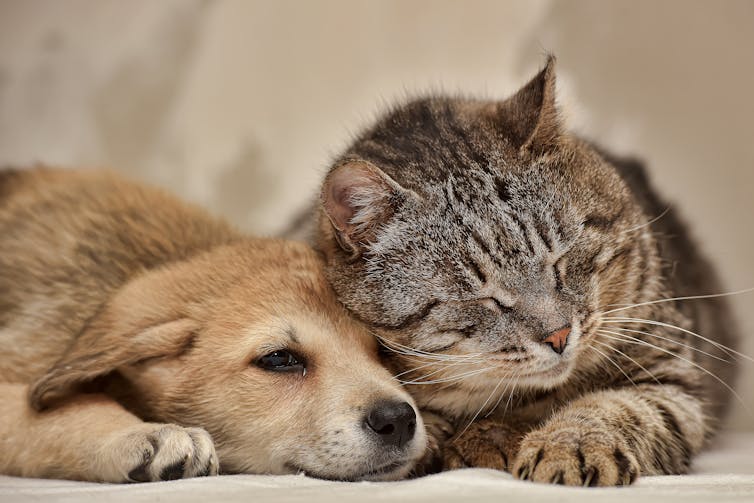Source: The Conversation (Au and NZ) – By Kristin Diemer, Senior Research Fellow, The University of Melbourne
A woman’s decision to leave a violent and abusive relationship is a complex process. She first needs to consider the risks to her and her children. Paradoxically, taking that step towards safety is also the time of greatest danger of homicide, sexual assault and increased violence.
Pets and service animals are also a part of the lives of many families. This means they are an important part of the decision-making process when women consider leaving a violent situation.
The pets may be a critical source of therapeutic support, but they may also be at risk of harm and used to exert control over people (“you leave and you won’t see those animals again”). Animals’ central role in family life means many victim-survivors of family violence are reluctant to leave because they fear their pets will be harmed.
To combat this, a family violence motion has been presented in the Victorian parliament that seeks to recognise animal abuse as a form of family violence. If all elements were adopted, it would increase the safety of women and children.
The motion advocates several policy and legislative options. These include:-
financial assistance to victim-survivors of family violence, including for the care of animals
-
a review of the Family Violence Protection Act 2008 to recognise that companion animals are affected by family violence and require protection
-
companion animals are placed in the care of either the victim-survivor or other appropriate carers to protect them.
These measures would be an important step towards improving support and so the safety of victim-survivors when animals are also caught up in family violence.
If this motion is passed, Victoria will be the second state after New South Wales to acknowledge the importance of the protection of animals for women’s safety. By comparison, more than two-thirds of US states have enacted legislation that includes provisions for pets in domestic violence protection orders.
Growing research evidence points unequivocally to the link between animal abuse and family violence. It shows animal cruelty occurs more frequently where family violence is also occurring.
Some studies suggest animal abuse is an indicator of more severe family violence and domestic homicide. If the animals are not safe, then neither are the humans, and vice versa.
Read more: Abuse and abandonment: why pets are at risk during this pandemic
Recognition of the need for intervention orders to include animal protection is not the only aspect of policy in need of review. Currently, if the companion animal is registered to the violent partner as the owner, a woman can be charged with theft for taking the animal with her, even when he is threatening the animal. The provision in the motion for need and protection to override ownership is therefore important.
Other concerns arise with microchips: the owner of the animal can trace the animal and locate a woman who is in hiding if she does not put a notice on the microchip database not to disclose her address. Some organisations (including veterinary clinics) are now bringing this to the attention of women using their services.

Unsurprisingly, the need for financial support is high on the motion’s agenda. In particular, there are housing and refuge options to consider.
Currently, women leaving violent situations have few options to take their animals with them. Women with disabilities who have service or therapeutic animals are at a distinct disadvantage when trying to leave and find suitable accommodation.
Bringing an animal into a refuge or emergency accommodation can be disruptive for other residents, especially if they have a fear of animals or allergies. Keeping animals with women and children is therefore not always the best option in a crisis. Dedicated animal shelters allowing for up to two months of care need to be made available.
In some regions, there are limited networks of animal shelters and veterinarians that have developed these resources to shelter dogs and cats for short periods. Beyond household companion animals, there is also a great need for support for large animals such as horses and goats, particularly in rural communities.
The changes the motion is calling for are timely. They are not radical, but would be an important further step in the response to family violence, backed by current research.
Advances in multi-agency risk-assessment tools and innovations within the refuge and specialist family violence sector are highlighting animal abuse as an important consideration in responding to family violence.
Read more: It’s time ‘coercive control’ was made illegal in Australia
– ref. In Victoria, animal abuse may soon be considered a form of family violence. Here’s why that matters – https://theconversation.com/in-victoria-animal-abuse-may-soon-be-considered-a-form-of-family-violence-heres-why-that-matters-156284







